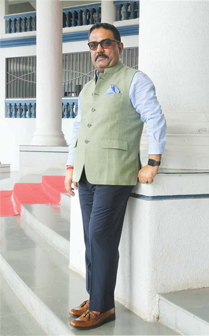
Chandan Chattaraj, President-HR (India & Global), U Flex Industries, on how gender sensitivity is both contextual and cultural, and how educating youth-with a view to turning out employable talent-needs to be a joint endeavour between the government, society and private sector
Well, yes and no! While there is a good chance that a sizable chunk of a particular sample would be unemployable, the numbers and ratios would vary with different groups—in other words it would be unfair to tar everyone with the same brush. After all, we are still a country where some of the finest students who are picked up the nation's premier engineering institutes and make a wonderful contribution to society later on are from small towns, and very difficult circumstances.
As far as ownership of the issue goes, it's not fair to pick on professional colleges, be they engineering or management—education starts at the school level and it has to correspond with the growing needs of society and business. Perhaps, a private-public model for education would work best.
I would not like to compare education systems in India to the US—everything is vastly different. We are hugely competitive—everything is marks driven. So yes, while we do have young adults lacking basic skills such as cooking or changing a tire. Industry is witnessing huge influx of talent from small towns who are doing such a great job with their lives. Having said that, yes we do need to teach our youth these basic survival skills that go beyond the classroom.
We have come a distance but much more needs to be done. Especially in an Indian context, successful women at the top will not happen by accident. There needs to be a structure, force and approach to that intent. Take, for instance, the move to give women six months maternity leave; I wish industry had taken the decision by itself—but if it's happening by law, so be it. At least there is a conversation happening to that effect. Having said that, gender equity is not something companies can foist top—down; it needs to start from that most basic of all social units—the family. Typically the geographies where female welfare is a top priority are societies where they are mindful of their girls at every level.
When we talk of gender sensitivity considering the peculiar life roles played by women—we need to take into account the cultures the female work force is coming from. U-flex operates in Dubai, India, Poland, Egypt and the US. All of these are different cultures where equity and sensitivity mean different things. For instance, in some countries women can work in plants; and that's a different ball-game altogether. We have to recognise that different cultures have different needs and accordingly make changes, be it with regard to hours of work from home or other needs, including security. In India, for example, flexi-packaging is the way to go.
“Successful women at the top will not happen by accident. There needs to be a structure, force and approach to that intent”

Humility and humanness. These two qualities are absolutely the deal-clincher for me! They work every time and anytime and give the youth the leeway to learn and grow.
At the same time, I would like young people to be grounded and approachable. Also, it is a good idea to read, much beyond the college curriculum. Information is key in today's context. Above all, keep your patience, even when things don't work out the way you would want them to.
Well, there have been so many, the process of learning never stops. My life is a mix of circumstances plus certain deliberate choices. But still, if I had to pick one it would have to be the point at which I was picked up by Tata Steel on campus. I was a small-town student from Dhanbad, Jharkhand and suddenly I was a part of the world of commerce and industry!
I have very radical thoughts on the subject. Choose to do what you enjoy—and it won't feel like work!
Having said that, companies also need to do their bit. Employee engagement programs to address stress are one thing. But hiring the right people for the joy is essential. If we can manage that, the challenges become much easier. Personally, I am a cricket buff and follow and play the game whenever possible. Apart from this I am a diehard dog-lover and look forward to being received by my pets every day.
By Kalyani Sardesai